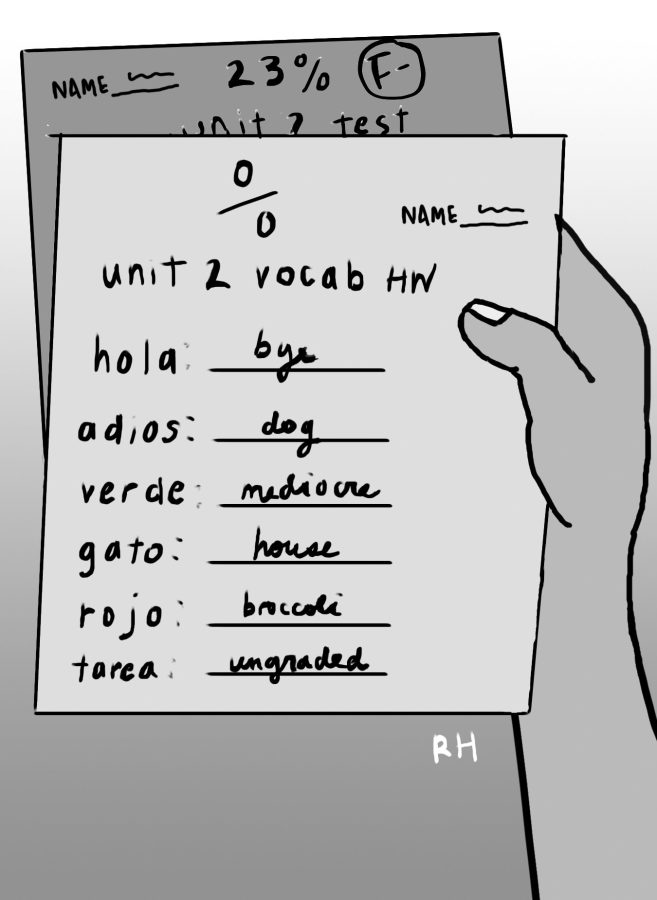There aren’t many things worse than a condescending student in the classroom. These rude geniuses with their awful work ethic always manage to get a good grade in the class. As if one person who fits this criteria was not bad enough, imagine several of them in the same classroom.
Before the school year, the Palo Alto Unified School District reinstated a new curriculum for all world language courses. After the Western Association of Schools and Colleges proposed this new system for all school districts, the school board made the decision to adopt it.
“This is district wide; it’s all part of our WASC work,” said Christy Resinger, a French teacher at Palo Alto High School. “All high schools and middle schools are using this new curriculum.”
This curriculum includes a new grading system which has been debuted in all world language classes.
In this new system, tests are worth 100 percent of a student’s grade. Classwork and homework are all formative assessments and contribute nothing to one’s overall grade in the class.
The new grading standards must be changed because homework reflects on how much effort a student puts into the class. It also allows lazy, but fluent-speaking, students to get better grades in the class.
It is difficult to learn a new language, and practicing can go a long way in understanding it. However, because homework and classwork do not affect students’ grades, many often choose to take it less seriously, and left uncompleted. Especially for students in lower-level language classes, doing homework is crucial for understanding the material, all of which is completely foreign to a first or second-year language student. As a result of not completing all homework, students’ test scores may drastically drop.
“I wish our curriculum was more oriented on quality classwork and not entirely on test scores because factors such as homework, classwork and participation are the major components of understanding the class and things covered on the exams.”
Alex Evans junior in AP Spanish Language
This new curriculum is constructed ideally for fluent speakers. Many fluent speakers perform flawlessly in this system
Although some of these students are courteous and disciplined, many do not take the class seriously and do not listen attentively. Additionally, the homework and classwork that they do not complete have no effect on their grade. Despite their neglect, they often perform much better on tests because of their improved natural understanding of the subject. Because tests are the only factor in the gradebook, these fluent speakers receive much better overall grades. In many cases, classwork and homework are good ways of reflecting on one’s learning in the classroom.
On the other hand, some non-fluent speakers complete their homework so they can better understand of the material. They try hard to finish their homework as a form of good practice. Although they work hard, assessments can sometimes be too difficult to score well on. Consequently, grades among non-fluent students drop. After spending hours each week completing tedious homework tasks, all of this work counts for nothing in the grade book.
The current world language grading system is inequitable for not only non-fluent speakers at high levels of learning, but also non-fluent speakers of any level. Regardless of whether a student is in Japanese 1, French 3 Honors or AP Spanish Language, homework should count towards a final grade because it shows how much work students have put into the class, which may not be accurately reflected by assessments.
Nonetheless many teachers believe that the new curriculum will help students in many ways.
“It’s all about can-do statements, what can the student perform. The emphasis is on what the student performs. The tests, for example, show what a student can perform. Students must know whether they can write it, read it and understand it.”
Christy Resinger
Although assessments are the best way of reflecting on a student’s knowledge, homework is the best way of reflecting a student’s work ethic in the class. Countless hours of reading and writing exercises should not be unaccounted for.
The transition from French 3H to AP French Language has been the most difficult one that I have personally faced as a student. We said goodbye to songs, games, crosswords and a relaxed atmosphere. In came a new learning system straight from the textbook.
“I have come to realize [that] the bump from last year is colossal, and I find some aspects very challenging,” said Luc Pardehpoosh, a junior in AP French Language. “If it was up to me, I would reinstate participation and homework into the gradebook to help the non-fluent people in the class achieve their goals. In my opinion, I care more about the grade than my AP score, but to some it may be different.”
AP courses are designed to prepare for the AP tests at the end of the school year. However, preparation for the AP test should not hinder students grades.
At the end of the day, tests should always be worth more points than homework. Homework and classwork do not have to count for much in the gradebook, but they should have a significant enough impact to help non-fluent students.
Ultimately, homework gives students a better way to understand material, because it is not made to stress them out; students often find themselves stressed when completing quizzes or tests, making it harder for them to comprehend material. As long as unnecessary assignments are left out, homework provides students with a good method of learning. It should be graded, because students spend hours each night completing it. All of this work cannot be overlooked by the teachers.

